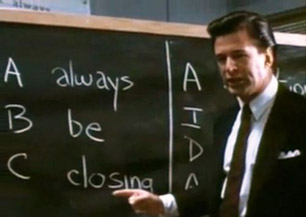|
|
Viking Night: Glengarry Glen RossBy Bruce HallApril 18, 2012
Shelly tries to bribe Williamson into giving him some of the premium "leads" - the personal information that companies buy and sell about customers so they can buy and sell those same people again and again. Shelly launches into his super slick, 20 years stale Don Draper charm offensive while Williamson squirms in his own skin, the way a Company Man should - torn between his desire to be one of the guys, and the illusion that he can ever really be THE guy. George and Moss have a few drinks, talk about oppression, the Proletariat, getting back at The Man…and the next day, something big happens. Everything changes, and that's where it gets truly thick and good, like a plate of 20-minute-old pancakes. The great thing about Glengarry Glen Ross is just what I said a moment ago - it's about what adversity brings out in people. Some people reapply themselves. Some start stabbing everyone else in the back. Others wait for the dust to clear and pick up the scraps. It's Death of a Salesman on steroids - and yeah, the play won a Tony. David Mamet. Boom. Enough Said. But even more, this is about a great script and a great concept, and what those things out in great actors. Al Pacino keeps a low profile until the third act, but when he shows up again - well, let's just say that's a pinch point. The endgame of Glengarry Glen Ross is a tour de force of actors being actors. It's nitty gritty stage level stuff between veterans young and old, full of close ups with cigarettes and well placed shadows, just like an old Perry Mason episode. The last half is shot mostly with natural light rather than the cramped, oddly lit sets of the first half. It’s as though someone removed a tarp from the film, enabling the light of day to reveal the truth about Premier Properties and its den of opportunists. Glengarry Glen Ross is just Good Stuff, and from a cinematic standpoint it's not unlike certain exotic foods you might enjoy just a handful of times in your life. Whether to you that means caviar, lobster, or something that's actually good - it should mean that this is a must own film for anybody who enjoys film. It's a deep dish. It seals the deal. Always be closing. Yeah.
|

|
|
|

|
Friday, November 1, 2024
© 2024 Box Office Prophets, a division of One Of Us, Inc.


